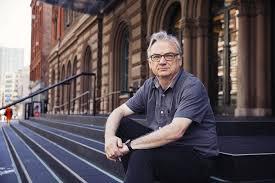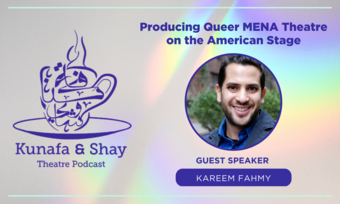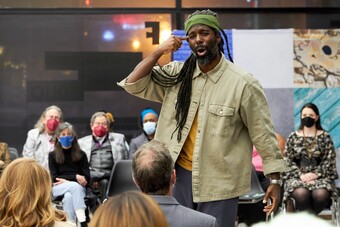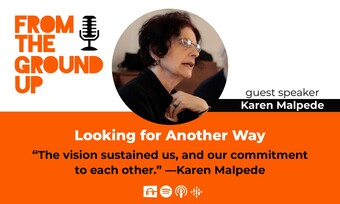Interview with Richard Nelson
Aaron Malkin: I saw Sad and Sweet and I was really taken by its urgency. It often seems like something happens and four years later there’s a play about it. I thought it would be really interesting to talk to you about how you write the Apple family plays. So, I would like to start—for people who don’t know what the plays are—with how you describe the Apple Family plays.
Richard Nelson: Well, they are a series of plays being done at the Public Theater about the same group of characters, the Apple family: three sisters, a brother, all in their late forties through fifties, their uncle, and one of the sister’s boyfriend. Each of the plays will open on the day that it is set. And each of those days will have a social, slightly political, reference. The first play opened on election night, 2010, the second opened on the tenth anniversary of September 11. And there will be two more plays.
Aaron: If you were going to describe them in terms of genre or style—
Richard: They are plays that are very theatrical in that they are obviously theatrical. The sets are extremely minimal: a table, a few chairs, a rug, a few props. The arrangements of the furniture are set up in advance by the actors and are taken away by the end. And, yet, the individual moments are naturalistic. It’s trying to create a sense of the audience, us, eavesdropping on a conversation.
Aaron: I thought the juxtaposition of the theatricality and the naturalism was really striking. You mentioned that there was a social or political setting in each of the plays—how did you pick which dates and why was it important that there was a political or social setting?
Richard: I write in great detail about this in a note to Hopey Changey and a note to Sweet and Sad, so, I’ll just read it to you, because it’s just much clearer than anything I could say. “We’ve become used to viewing our politics and our political landscape through the lens of journalists or commentators who are now comedians. Their observations are certainly invaluable to us and the very best of them struggle valiantly to be a check on vanity, arrogance, ignorance, and stupidity. However, what has been missing from our political forum is the individual’s voice.” And then I continue—this is equally important here to your question—“Theater has a unique place in the history of society. After all, theater is the only artistic form that uses the entire live human being as its expression and hence carries within itself a very specific view of the world, and that view is, in a word, humanistic. The individual is at the center of the play and the world of the play revolves around the individual; that’s simply what a play is. By a play’s very nature, the heart of any play is the individual voices of its characters. And in times like our own when human voices seem more disembodied than ever, when words seem pulled from their meanings and turned into rants and weapons, the theater can, I believe, be a necessary home for human talk. That is, a place where human beings talk about their worries, confusions, fears, and loves, and where they also listen.”
So, I have chosen periods of time that are communal, in that everybody in the theater will be sharing with the characters an event that everyone has a relationship with. When you add that to the kind of audience that one expects at the Public Theater downtown—which will be, by and large, a liberal audience, then you have even more a shared experience of events from a particular point of view. That’s where one begins the conversation and the listening and talking, the human talk, that’s going on in the play. So a communal event is what’s important, as opposed to simply a societal day event, like a Christmas or a New Year’s or whatever, where everyone celebrates that quite differently.
Aaron: You said that “by a play’s very nature, the heart of any play is the individual voice of its characters”— how has working with this ensemble of actors shaped the plays and shaped what you were able to do in terms of creating the family dynamic and the naturalistic art?

Richard: When I wrote Hopey Changey, I didn’t know who was going to be in it. When I wrote Sweet and Sad, I offered the same actors all the roles for Sweet and Sad immediately after finishing Hopey Changey, before I’d written a word of Sweet and Sad. So, I wrote, in essence, with them in mind, to some extent. In the way in which a writer can who gets to know the actor and can pull certain traits and see certain things in them. But that’s as far as it went in writing the play until I had a reading with these actors. At that point, we began a conversation that I thought was pretty unique, because I know of no instance where one has brought together the same actors to play the same characters on the same set, but in a different play. So, what that meant from the time we started to talk about the play was that we were already well advanced in the conversation. It would be like talking about a play after the play had closed. The actors were full of subtle understanding of both their relationships with each other and also their understanding of themselves and their own characters. They brought that in a big way into the readings and one workshop we had, and into the rehearsal period, which was extremely useful. When you write a play with six people on stage most of the time, all seeing every moment from their point of view, sometimes as a writer you can slip up and hedge a little bit or look something over which the character themselves looking at it so crystal clearly might say, ”Hey, I’m not sure I would do that, or wouldn’t I be doing this? Wouldn’t I be participating or not participating?” And, indeed, that’s where the conversation went to on a number of occasions and at many points in the play, which allowed me to clarify or explain things.
I don’t know how these plays will work. I don’t know what will happen and what they will seem like. I do know that one of the reasons I wanted to make a point of the disposable play was I wanted it to be a present experience.
Aaron: Initially, [with Hopey Changey], you called these plays disposable plays. But, now, [with Sweet and Sad] you are rethinking that a little bit because you’ve said it would be nice to see them in rep or in one long day of theater down the line. Do you have any sense, or can you have any sense, of how you think the plays will play in ten years or in a city farther from Rhinebeck, New York?
Richard: The hope is that the very specificity of the plays combined with the overriding arc of covering the same people over several years might tell a rich and compelling story, so instead of feeling dated, the plays as a whole might just feel true. We’ll see. We all know of pieces of literature that are so minutely specific, but by that laser focus and that truth, it carries with it a kind of universality. That’s a possibility. I don’t know how these plays will work. I don’t know what will happen and what they will seem like. I do know that one of the reasons I wanted to make a point of the disposable play was I wanted it to be a present experience. You know, within our theater culture right now are a lot of people, both audience members and other people, who look at plays and are trying to pick winners and losers in the sense of what’s going to be a big hit and what’s going to not be a big hit. And a play that is going to open on the day that it is set I knew would confuse people—oh my god, how can this be running for ten years? I wanted to take those kinds of concerns off the table and just make it a present experience for the audience and not have anybody worry is this going to be a big financial hit? Is it going to be this or that? Just to be in the moment and let’s see what we’ve got.
Aaron: The last topic that I want to touch on is how do you sit down to write the very near future? How concerned were you about what actually would happen on September 11, 2011, for example, versus what you anticipated? When does the writing process stop?
Richard: The writing process stopped for Sweet and Sad—I had a deadline, which was 2:30 in the afternoon on September 11.
Aaron: Wow.
Richard: I wrote up to that deadline. In fact, I missed that deadline by ten minutes. I delivered the final draft at 2:40 on September 11. We changed lines, added lines, played with new lines, which we tossed out throughout that morning and that day until then. I knew that would be the case and so there are lines in there that could only have been written on that day because they relate specifically to what happened on that morning. I continued to work right up to that point and that’s the goal: to keep it going. I begged Oskar Eustis not to give me a matinee on that day—initially there was a matinee—so that I could have the time in which to do that work. I did the show with only five previews.
So, how do you begin the process? I have character arcs. I know what’s happening with people, or pretty much what’s happening with people along the way. So, there are those stories, and then what they will be talking about and where their emotional range is—(I pretty much knew what the emotional journey in a play about 9/11 was going to be, we all knew where we were)—I’m not quite sure where we’re going to be November 7, 2012. We don’t know where we are going to be emotionally or what’s going on, but I will make notes, I will write—I have written many, many notes on the play. I won’t begin to actually write it until April. I’ll start it then, do a draft, and no doubt, many things will happen in between the time I finish that draft and the time it goes into rehearsal.
The play—as you know from both plays—is not attempting to be a commentary. It’s not about characters or myself trying to make political points with an audience. It’s about a group of people trying to struggle with things that we in the audience are struggling with at the same time. So, what that means is if, in the case of Sweet and Sad, in the earliest draft there was some exchange and conversation about the situation of teachers and all of what was happening in Wisconsin, but that sort of dropped. You realize that that sort of faded away in terms of the kind of dinner table conversation I was after. It just got exhausted. It’s funny, it’s interesting how things come and they go within a sort of collective consciousness and that’s what I’m trying to deal with. That’s really the effort, the ambition.














Comments
The article is just the start of the conversation—we want to know what you think about this subject, too! HowlRound is a space for knowledge-sharing, and we welcome spirited, thoughtful, and on-topic dialogue. Find our full comments policy here
Thanks guys so much for this! This is really inspiring!
I think its interesting this concept of Theatre being about responding to the current moment!I remember when Troy Davis was executed, wanting to band together with a theatre crew and do a play, that day about that topic! In our world of development, do you think its possible for theatre across the country to do the work you are doing in this style?